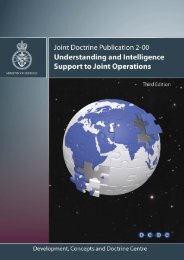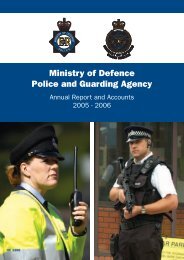Andrew Robathan MP - Ministry of Defence
Andrew Robathan MP - Ministry of Defence
Andrew Robathan MP - Ministry of Defence
You also want an ePaper? Increase the reach of your titles
YUMPU automatically turns print PDFs into web optimized ePapers that Google loves.
and explain the changes to the Scheme as a<br />
result <strong>of</strong> the Review. It will be delivered via<br />
presentations by the chain <strong>of</strong> command and<br />
will be included within initial military training,<br />
as well as at other key stages in a military<br />
career. It will also be available through desktop<br />
interactive media. Specialist staff working<br />
within the Service chain <strong>of</strong> command including:<br />
Unit Welfare Officers, Medical Officers and<br />
Human Resources Officers – all <strong>of</strong> whom can<br />
come into contact with AFCS claimants - will<br />
also receive an appropriate level <strong>of</strong> training.<br />
Mandatory medical advice<br />
Formal guidance for SPVA personnel is being<br />
put in place for situations where obtaining<br />
medical advice on claims will now be mandatory.<br />
Once developed, this revised guidance will<br />
ensure that specific claims in tariff levels<br />
1-6, and all reconsiderations and appeals<br />
will receive automatic medical opinion.<br />
Military oversight in the processing <strong>of</strong> claims<br />
While there is no routine military oversight<br />
within the SPVA <strong>of</strong> the AFCS claims process,<br />
claims assessors and Scheme managers have<br />
access to advice from military staff within the<br />
Agency, if needed. Additionally, engagement<br />
and interaction has been increased with the<br />
Service chain <strong>of</strong> command. As a result, the<br />
exchange <strong>of</strong> information and provision <strong>of</strong><br />
two-way advice on injury context and military<br />
practice is increasingly common place.<br />
An example includes military staff agreement<br />
for SPVA to access the Army Incident Lessons<br />
Management System (AILEMS). This will provide<br />
the SPVA with quick, accurate information <strong>of</strong><br />
incidents that have occurred requiring medical<br />
assistance. This will help the SPVA collate the<br />
necessary evidence when processing claims.<br />
SPVA access to the <strong>Defence</strong> Patient Tracking<br />
System (DPTS), as used by the military medical<br />
services, is also being considered to ascertain<br />
whether similar mutual benefits to those realised<br />
through shared AILEMS access can be replicated.<br />
Payment on account/fast payment<br />
A new provision has been introduced to the<br />
Scheme that will provide Service Personnel with<br />
the option <strong>of</strong> receiving a ‘fast payment’ through<br />
the AFCS to meet the Review recommendation<br />
to award a modest, but not insubstantial, upfront<br />
payment for the more seriously injured.<br />
The following qualifying criteria will need to be<br />
met in order to take advantage <strong>of</strong> this option:<br />
z The injury in question was caused by<br />
service; and<br />
z One or more injuries sustained as a<br />
result <strong>of</strong> service will give rise to an<br />
entitlement at levels 1 to 8 <strong>of</strong> the tariff;<br />
and<br />
z A claim has been made for a fast<br />
payment.<br />
A payment <strong>of</strong> £60,000 will be made to eligible<br />
personnel, the revised lump sum amount<br />
for a level 8 tariff award. In cases where the<br />
fast payment criteria had not been met, the<br />
individual will be advised that they are still able<br />
to put in a claim for AFCS in the usual way.<br />
This option will not be imposed on Service<br />
personnel but if chosen, will provide financial<br />
reassurance and support to both them and<br />
their families as quickly as possible after<br />
a serious injury has been sustained.<br />
Interim awards where prognosis is uncertain<br />
Revised guidance has been introduced to<br />
increase the use <strong>of</strong> the power to make an<br />
interim award where the prognosis <strong>of</strong> an<br />
individual’s injury is uncertain. Until now, an<br />
interim award could be made for a maximum<br />
<strong>of</strong> two years, after which it is made final. We<br />
have now introduced a power that, where<br />
prognosis remains uncertain at the end <strong>of</strong><br />
two years, the award can be extended for a<br />
maximum <strong>of</strong> a further two years. The making<br />
<strong>of</strong> an interim award does not carry a statutory<br />
right <strong>of</strong> appeal, and the MOD recognises<br />
that, for this reason, the new power would<br />
be used only in exceptional circumstances.<br />
The Review <strong>of</strong> the Armed Forces Compensation Scheme - One Year On<br />
17


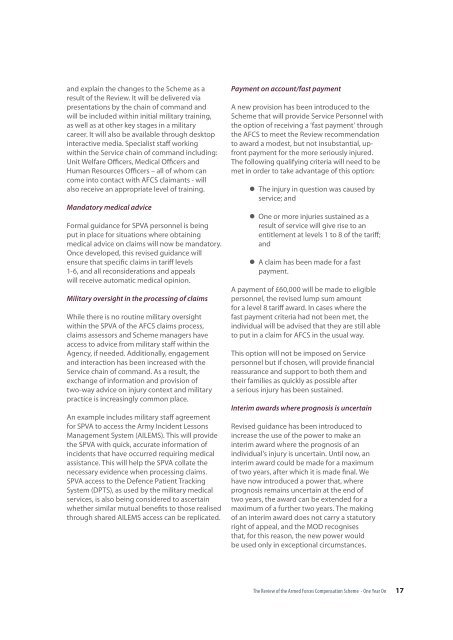
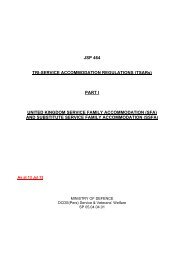
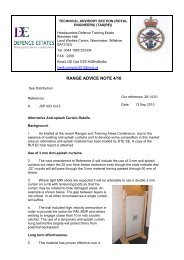

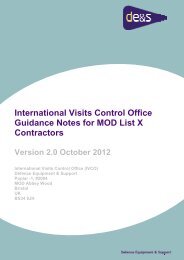
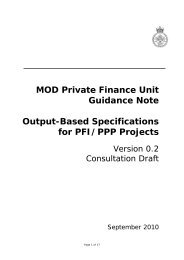
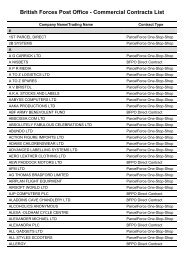
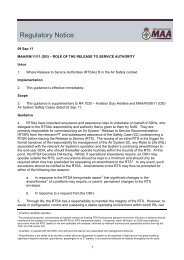
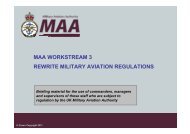
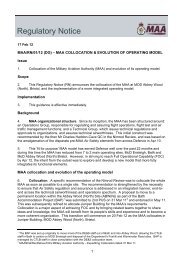
![MAA Regulatory Publications - FAQs PDF [37.3 KB]](https://img.yumpu.com/5906104/1/184x260/maa-regulatory-publications-faqs-pdf-373-kb.jpg?quality=85)
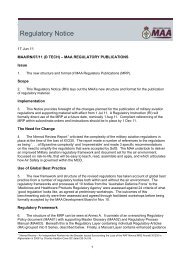
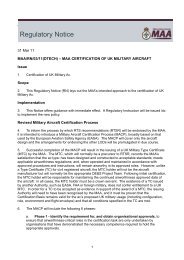
![3750 edition 6 PDF [263.5 KB] - Ministry of Defence](https://img.yumpu.com/5901071/1/184x260/3750-edition-6-pdf-2635-kb-ministry-of-defence.jpg?quality=85)
